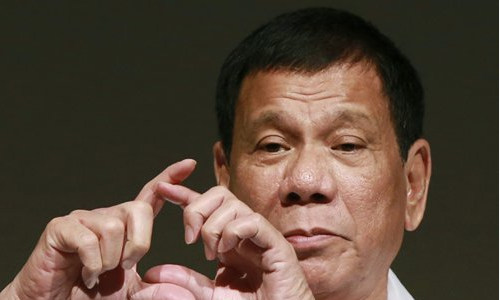HOME >> OPINION
With Duterte’s visit, Manila will likely stop looking at rearview mirror
By Chen Xiangmiao Source:Global Times Published: 2019/8/27 19:23:40

Photo: IC
Whether Philippine President Rodrigo Duterte, who is scheduled to visit China from Wednesday to Sunday, will discuss the South China Sea issue with Beijing has caused quite a stir among some Western and Philippine media outlets.
The interaction between China and the Philippines over the South China Sea issue in 2019 has seen interference by some in the Philippines and countries outside the region. In particular, some members of the opposition and pro-US elites in the archipelago nation parade the "China threat theory" by trying to make an issue out of fishing rows with China in the waters surrounding Zhongye Dao and the alleged entry of Chinese warships in Philippine waters. They aim to fuel grass-roots nationalist sentiment and pressure the Duterte administration to raise the South China Sea arbitration ruling with Beijing.
Actually, compared with the administration of former president Benigno Aquino III, the importance of the South China Sea issue in Sino-Philippine relations has been lowered. Since bilateral relations turned around in the second half of 2016, cooperation in trade, investment and people-to-people exchanges under the framework of the China-proposed Belt and Road Initiative has replaced the South China Sea issue to become the most important agenda between the two countries.
According to statistics, the total trade volume between China and the Philippines increased from $17.65 billion in 2015 to over $30 billion in 2018, nearly doubling in three years. China's investment in the Philippines in 2018 was 48.7 billion yuan ($6.76 billion), while the figure for 2017 was only 576 million yuan ($80 million). Additionally, the number of Chinese mainland tourists traveling to the Philippines rose from 490,000 in 2015 to more than 1.25 million in 2018.
The Duterte administration, sometimes, had spoken tough on the South China Sea dispute. Such proclivity has been forced by the opposition, pro-US forces and nationalist hubris, who regard the South China Sea issue as a leverage in order to queer the pitch for the internal and foreign affairs of the Duterte administration.
These forces are keen on using sensitive agenda, such as cooperation in oil and gas exploration between the two countries, to whip up "patriotic" and "anti-China" nationalist sentiment of the Philippine public. They attempt to destroy the Duterte administration's policy of shelving maritime conflicts and enhancing economic and trade cooperation. Their ultimate goal is to scuttle the Duterte administration's efforts to consolidate and boost domestic support by improving the economy and people's lives.
However, Beijing-Manila ties have been on the right track. Whether the two countries talk about the South China Sea issue will not have a substantial impact on overall bilateral ties. Both countries have closely cooperated on trade, economy and people-to-people exchanges, and their interactions on the South China Sea have also long been focused on negotiation and cooperation. China and the Philippines have launched the bilateral consultation mechanism, providing a long-term guarantee to actively ease maritime conflicts, enhance practical cooperation at sea and explore the final settlement of relevant maritime disputes. Substantial achievements have also been realized in domains such as marine fishery and aquaculture, joint maritime law enforcement and oil and gas exploration.
Although the South China Sea issue has been on the long-term agenda of the two countries, it will not fundamentally change thawing Sino-Philippine relations.
Regional power competition incited by outside countries, such as the US and Japan, and unilateral moves by some claimants such as Vietnam have recently intensified, which, to some extent, has disrupted the stability of the South China Sea. However, dialogue and cooperation will remain the theme between China and the Philippines on the South China Sea issue thanks to the joint efforts. The two countries will jointly explore and exploit oil and gas resources, conserve fishery resources, sustainably develop fisheries resources and cooperate in fields like marine tourism and scientific research and environmental protection.
The South China Sea arbitration is a lingering shadow in the bilateral relations between China and the Philippines, but facts have proven that both countries can resolve their divergences through negotiations.
The author is an assistant research fellow, National Institute for South China Sea Studies. opinion@globaltimes.com.cn
RELATED ARTICLES:
Posted in: